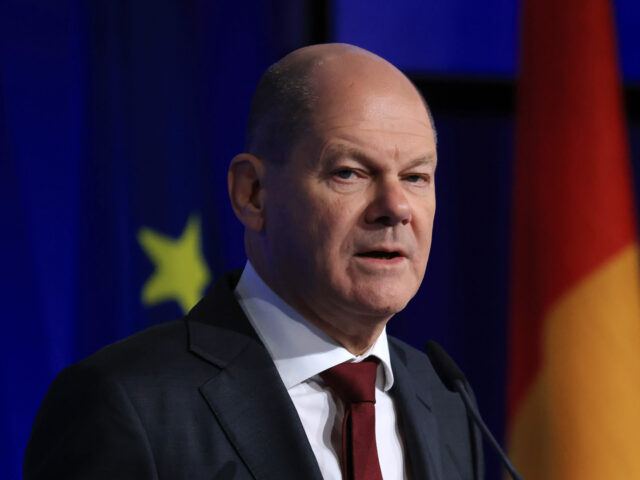German Chancellor Olaf Scholz said that Europe should look to rekindle Soviet-era peace agreements with Vladimir Putin following the war in Ukraine to prevent further “imperialistic” aggression from Moscow.
In an address delivered at the Berlin Security Conference on Wednesday, Chancellor Olaf Scholz of the left-wing Social Democrat Party (SPD) said that he believes that Russia can no longer win the war on the battlefield, claiming that attacks on infrastructure throughout Ukraine display a “desperate strategy of scorched earth”.
Scholz said that his government would continue to support Ukraine, for as long as it takes: economic, financial, humanitarian… and also with weapons,” no matter the impact on the German economy.
Despite his apparent willingness to continue the conflict by supporting the Ukrainian war effort, Scholz said that there should be a path towards the previous peaceful order in Europe.
“We have to go back to the agreements which we had in the last decades and which were the basis for peace and security order in Europe,” he said according to a Berlin correspondent for the Times of London.
“And for Russia, this also means that it accepts that there are open-minded societies, open societies, democracies, that follow completely a different way of how they are governed and how they attract people . . . In the end, there is no aggression coming from the member states of the European Union, there is no aggression coming from Nato, and all questions of common security could be solved and discussed. There is a willingness to do so.”
“We can come back to a peace order that worked and make it safe again if there is a willingness in Russia to go back to this peace order.”
The combative language is a radical departure from alleged German attitudes earlier in the war, which are said to have been in favour of a rapid defeat for Ukraine to minimise the economic impact of a war on its doorstep to the rest of Europe. The claims, made by former UK Prime Minister Boris Johnson, have been denied by Germany.
Though the comments towards a potential peace were reportedly met with applause in the room, Scholz stressed the need for Germany to finally meet its NATO defence spending commitments — an issue long raised by former President Donald Trump — noting that his government’s plans to spend 100 billion euros on re-arming the German military will represent the “biggest investment in our armed forces since its inception.”
Fundamentally, the German chancellor said that it will be more than just mere financial investments, however, saying: “From procurement to equipment, from strategy to operations, we need more decision-making, more risk-taking and more efficient structures. And we need a European defence industry that meets the demands of modern armed forces.”
This will include a German-led project to build a European missile defence shield system, which Scholz said has already seen 14 other EU nations join. The German leader went on to say that as long as Russia has the ability to launch nuclear weapons, NATO needs a “credible deterrent potential”, which is why the German government have decided to purchase F-35 fighter jets to be a part of its nuclear arsenal.
Though Scholz said that he will be seeking to expand missile defence systems, which represented a key point of contention with Vladimir Putin prior to the full-scale invasion of Ukraine earlier this year, the chancellor said that “there is no aggression coming from the member states of the European Union, there is no aggression coming from Nato, and all questions of common security could be solved and discussed. There is a willingness to do so.”
The speech from Scholz may be seen as a break from other European nations, particularly Poland and the Baltic states, which have been opposed to entering into peace negotiations with Russia. However, the German chancellor refused to go as far as Hungarian Prime Minister Viktor Orbán, who has actually called for negotiations to begin immediately.
Follow Kurt Zindulka on Twitter here @KurtZindulka

COMMENTS
Please let us know if you're having issues with commenting.